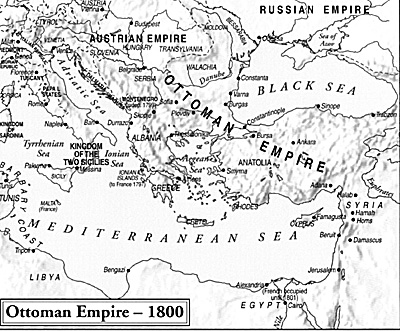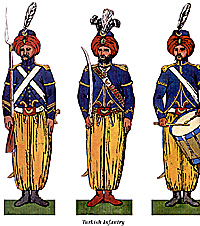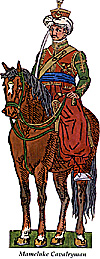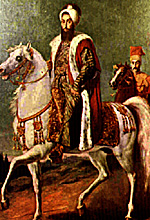
Bonaparte's Egyptian campaign in 1798 placed France at war with the Mamelukes and their feudal overlord, the "Sublime Porte," or Ottoman Empire. On the way to earning their 19th-century title, "sick man of Europe," this earlier version of Turkey stretched from Algeria to Iraq, and, although presenting an image of grandeur, was a giant with feet of clay. During the Napoleonic era, Ottoman leaders grappled with issues of nationalism, ethnic identity, and how to position themselves in relation to the shifting realities of international diplomacy.
Ruling this sprawling multiethnic state was Selim III (1789-1807), the Padishah, or Sultan, who, in theory, was both an absolute monarch and leader of the state's Muslim majority. In practice, Selim governed in conjunction with a confusing array of local officials. These ranged from loyal subordinates to bandits- like derebeys, or "valley lords," who maintained semi-autonomous fiefdoms within the heart of the empire.
The resulting decentralized administration reflected on the military. When formed into armies, this incongruous mass of half-trained soldiers, murderous mountaineers, and highly irregular cavalry taxed the abilities of even good commanders.
 Sadly for the Ottomans, such leaders were few and far between. High-ranking officers were poorly prepared for offensive actions, and only marginally better at defense. British General Sir John Moore conceded the average Ottoman troops were "...certainly material of which excellent soldiers might be formed." As for organization and leadership, however,"...a wild ungovernable mob, incapable of being directed to any useful purpose, destitute of everything that is required in an army, while their chief...was a weak-minded old man, without talent, or any military knowledge." Future French Marshal Alexander Berthier, who crossed swords with a similar force, shared these opinions, describing the opposition as more like "bands of robbers than troops of warriors."
Sadly for the Ottomans, such leaders were few and far between. High-ranking officers were poorly prepared for offensive actions, and only marginally better at defense. British General Sir John Moore conceded the average Ottoman troops were "...certainly material of which excellent soldiers might be formed." As for organization and leadership, however,"...a wild ungovernable mob, incapable of being directed to any useful purpose, destitute of everything that is required in an army, while their chief...was a weak-minded old man, without talent, or any military knowledge." Future French Marshal Alexander Berthier, who crossed swords with a similar force, shared these opinions, describing the opposition as more like "bands of robbers than troops of warriors."
While Ottoman armies gained notable victories, like overcoming the British at Rosetta (1807) or holding off Napoleon at Acre (1799), their overall record was poor. Indeed, these soldiers were often more deadly to their own people. Selim found this out in 1807, when his efforts at military reform backfired, causing a military coup leading to his death.
 His nephew Mustafa IV lasted only until 1808, when the army ousted him and elevated Mahmud II to the Sultanate (ruling until 1839). His chief supporter, Mustafa Baiakdar, who became Grand Vizier, carried on Selim III's reform efforts. In 1806, old disputes with Russia over Bessarabia, Moldavia, and Wallachia drove the Sultan (encouraged by France) to initiate a war that absorbed substantial Russian forces and sputtered on until 1812, when Britain brokered a settlement, transferring Bessarabia to Russia. Simultaneously, the Ottomans coped with several serious rebellions, not the least of which was that by Serbia (1804-1813), whose long-running search for independence led it to seek and win support from Russia.
His nephew Mustafa IV lasted only until 1808, when the army ousted him and elevated Mahmud II to the Sultanate (ruling until 1839). His chief supporter, Mustafa Baiakdar, who became Grand Vizier, carried on Selim III's reform efforts. In 1806, old disputes with Russia over Bessarabia, Moldavia, and Wallachia drove the Sultan (encouraged by France) to initiate a war that absorbed substantial Russian forces and sputtered on until 1812, when Britain brokered a settlement, transferring Bessarabia to Russia. Simultaneously, the Ottomans coped with several serious rebellions, not the least of which was that by Serbia (1804-1813), whose long-running search for independence led it to seek and win support from Russia.
The Sultan, with French assistance, defied a British naval expedition against Constantinople in 1807 and also defeated an ill-starred British land expedition against Egypt, meant to support Britain's ally, Russia, and to counter Napoleon's influence with the Sultan.
The Treaty of Tilsit, and the ensuing Franco-Russian rapprochement, removed this friction with Britain but raised the specter of Napoleon as an enemy again. Indeed, Napoleon tried repeatedly to tempt the Russian Tsar into a joint military project against the Ottoman Empire, still nurturing an ill-defined dream of striking at British interests in the East.
 Wars of the Ottoman Empire (1792-1815)
Wars of the Ottoman Empire (1792-1815)
1798-1815: numerous small wars, ethnic conflict, or banditry
1798-1800: war with France
1804-1813: revolt in Serbia
1806-1807: war with Russia and England
1807-1808: coup d'etat and civil war
1809-1812: renewed war with Russia
1811-1818: revolt in Arabia
The Sultan Selim III who, in theory, was both an absolute monarch and leader of the Ottoman Empire's Muslim majority until his assassination in 1807.
 Mehemet (Muhammed) Ali, who proudly noted being born in the same year as Napoleon and Wellington, fought Bonaparte at Abu Kir (1799), then took over Egypt in 1805. Ruling until his death in 1848, he hired numerous French experts, many of whom were Napoleonic veterans working in his army.
Mehemet (Muhammed) Ali, who proudly noted being born in the same year as Napoleon and Wellington, fought Bonaparte at Abu Kir (1799), then took over Egypt in 1805. Ruling until his death in 1848, he hired numerous French experts, many of whom were Napoleonic veterans working in his army.
More Powers of the Napoleonic Era
- France
Great Britain
Duke of Wellington Profile
Austria
Archduke Charles Profile
Russia
Field Marshal Kutusov Profile
Prussia
Field Marshal Blucher Profile
Spain
The Peninsula War
Ottoman Empire
Minor Powers
Back to Table of Contents -- Napoleon #17
Back to Napoleon List of Issues
Back to MagWeb Master Magazine List
© Copyright 2001 by Napoleon LLC.
This article appears in MagWeb (Magazine Web) on the Internet World Wide Web.
The full text and graphics from other military history magazines and gaming magazines are available at http://www.magweb.com
Order Napoleon magazine direct